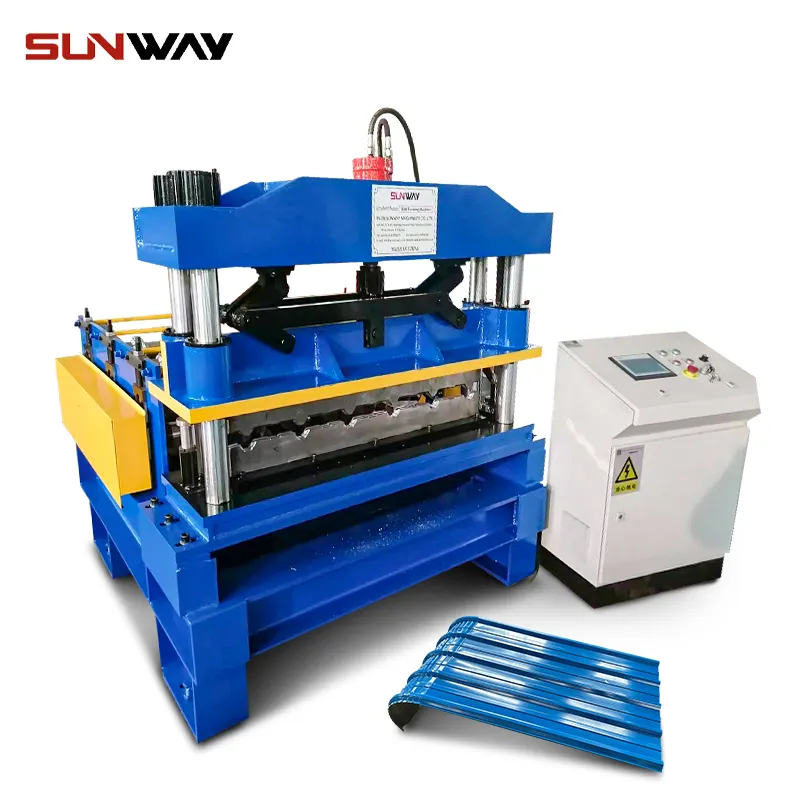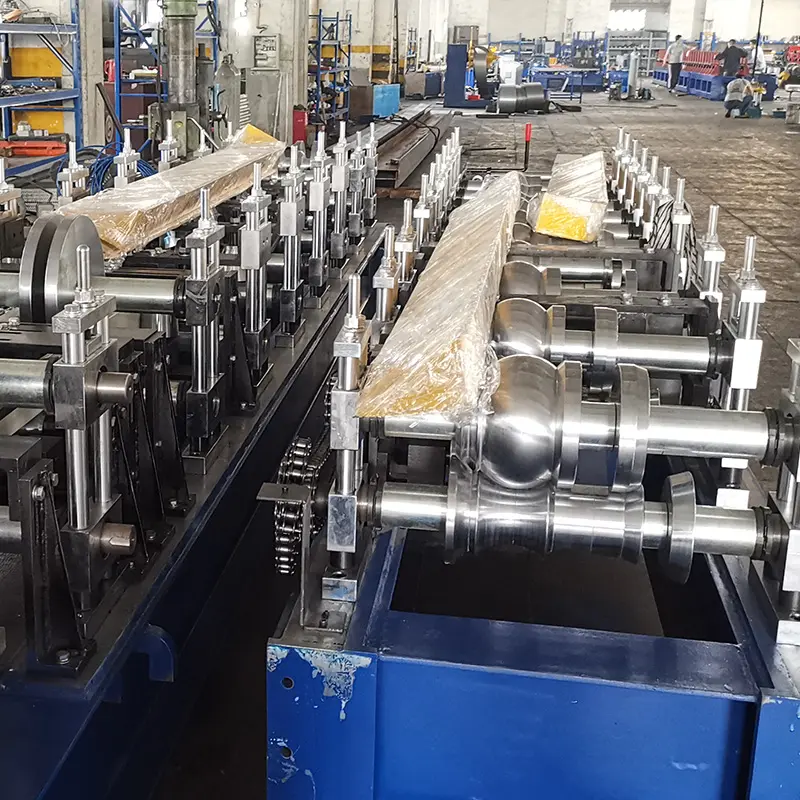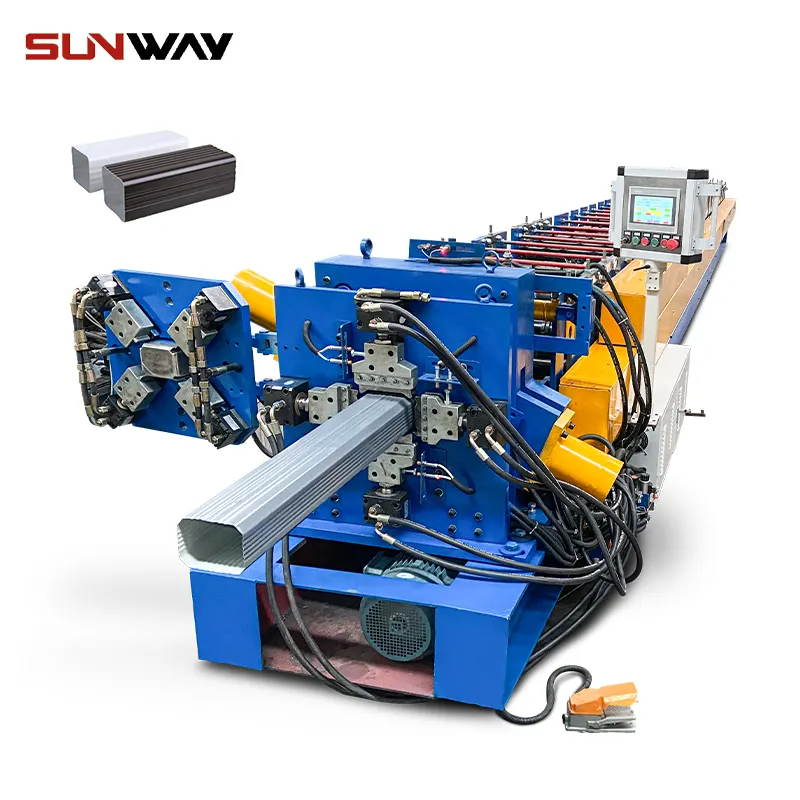ভূমিকা
Rain gutters play a crucial role in protecting buildings from water damage by channeling rainwater away from the roof and foundation. Over the years, the manufacturing process of rain gutters has evolved, and one of the significant advancements is the introduction of rain gutter roll forming machines. These machines have revolutionized the gutter production industry, offering increased efficiency, customization options, and cost savings. In this article, we will delve into the world of rain gutter roll forming machines, exploring their benefits, working principles, types, and more.
What is a Rain Gutter Roll Forming Machine?
A rain gutter roll forming machine is an automated manufacturing equipment designed to produce rain gutters in large quantities. The machine takes flat metal coils as input and transforms them into seamless rain gutter profiles through a continuous roll forming process. These gutters come in various shapes and sizes, catering to the specific requirements of different buildings and climates.

Benefits of Using a Rain Gutter Roll Forming Machine
উৎপাদন দক্ষতা বৃদ্ধি
Rain gutter roll forming machines significantly enhance production efficiency compared to traditional gutter manufacturing methods. The continuous roll forming process allows for rapid and uninterrupted production, reducing downtime and maximizing output.
কাস্টমাইজেশন অপশন
One of the key advantages of using a rain gutter roll forming machine is the ability to customize gutter profiles according to customer preferences. From choosing different materials to altering dimensions and shapes, these machines offer a high degree of flexibility.
খরচ সাশ্রয়
Although the initial investment in a rain gutter roll forming machine may seem substantial, it leads to long-term cost savings. With increased production efficiency and reduced labor requirements, manufacturers can produce gutters at a lower cost per unit.
স্থায়িত্ব এবং গুণমান
Rain gutters produced by roll forming machines boast superior durability and consistent quality. The seamless design reduces the risk of leaks and other potential issues, ensuring long-lasting performance.
How Does a Rain Gutter Roll Forming Machine Work?
The process of manufacturing rain gutters using a roll forming machine involves several key steps:
উপাদান প্রবেশ
The first step is to load flat metal coils, typically made of aluminum, steel, or copper, onto the machine. These coils serve as the raw material for the gutters.
রোল ফর্মিং প্রক্রিয়া
The machine then passes the metal coils through a series of rollers and dies, gradually forming the desired gutter profile. This continuous process ensures a seamless gutter without any joints.
Cutting and Length Measurement
Once the gutter profile is formed, the machine cuts the gutter to the required length using precise cutting mechanisms. Simultaneously, sensors measure and control the length to ensure uniformity.
Collecting the Finished Gutters
Finally, the finished rain gutters are collected and stacked, ready for packaging and distribution.

Types of Rain Gutter Roll Forming Machines
There are various types of rain gutter roll forming machines available in the market, each catering to specific production needs:
Single-Panel Roll Forming Machine
The single-panel roll forming machine is designed to produce a single gutter profile at a time. It is suitable for small-scale production or when a specific gutter design is required.
Dual-Panel Roll Forming Machine
The dual-panel roll forming machine can produce two different gutter profiles simultaneously, offering increased versatility and efficiency.
High-Speed Roll Forming Machine
The high-speed roll forming machine is ideal for large-scale production, as it can rapidly produce gutters at a higher output rate.
Portable Roll Forming Machine
Portable roll forming machines are designed for on-site production, allowing manufacturers to create gutters directly at the construction site.
Factors to Consider When Choosing a Rain Gutter Roll Forming Machine
Selecting the right rain gutter roll forming machine is critical to a successful gutter manufacturing business. Several factors should be considered during the decision-making process:
উৎপাদন ক্ষমতা
The production capacity of the machine should align with the anticipated demand for gutters.
উপাদান সামঞ্জস্যতা
Ensure that the machine is compatible with the type of metal coils you plan to use for gutter production.
Customization Features
Evaluate the machine’s capabilities for creating custom gutter profiles to meet customer demands.
Space and Portability
Consider the available workspace and whether portability is necessary based on your business requirements.
রক্ষণাবেক্ষণ এবং সহায়তা
Check the manufacturer’s maintenance and support services to keep the machine running smoothly.
Tips for Operating a Rain Gutter Roll Forming Machine
Operating a rain gutter roll forming machine requires attention to detail and adherence to safety guidelines. Here are some tips for smooth operations:
নিয়মিত রক্ষণাবেক্ষণ
Regularly inspect and maintain the machine to prevent breakdowns and ensure optimal performance.
নিরাপত্তা সতর্কতা
Train operators on safety protocols to avoid accidents and injuries during machine operation.
Proper Material Handling
Handle metal coils with care to prevent damage and ensure a continuous production flow.
Training and Skill Development
Invest in training programs to enhance the skills of machine operators for better efficiency.
সাধারণ চ্যালেঞ্জ এবং সমস্যা সমাধান
Despite the efficiency of rain gutter roll forming machines, certain challenges may arise during operation. Here are some common issues and how to troub leshoot them:
ম্যাটেরিয়াল জ্যামিং
- Ensure that the metal coils are properly aligned and fed into the machine to avoid jamming.
- Regularly clean the rollers and dies to prevent the accumulation of debris.
- Check for any misalignment or damage in the machine’s components that may be causing the jam.
Uneven Roll Forming
- Adjust the machine’s settings to ensure uniform pressure and alignment of the rollers.
- Check for any worn-out or damaged rollers and replace them if necessary.
- Verify that the metal coils are of consistent quality to avoid variations in the gutter profile.
Inaccurate Cutting
- Calibrate the cutting mechanisms regularly to ensure precise and accurate cuts.
- Verify that the length measurement sensors are functioning correctly.
- Inspect the cutting blades for sharpness and replace them when needed.
Machine Malfunctions
- Conduct regular maintenance checks and address any issues promptly to prevent major malfunctions.
- Keep spare parts on hand to replace any faulty components quickly.
- Train operators to recognize and troubleshoot common machine malfunctions.

Innovations in Rain Gutter Roll Forming Technology
The rain gutter roll forming industry is constantly evolving, and advancements in technology are shaping its future:
অটোমেশন এবং রোবোটিক্স
Increasing automation in roll forming machines reduces the need for manual intervention, leading to greater productivity and efficiency.
Advanced Material Options
Manufacturers are exploring new materials, such as eco-friendly and lightweight alloys, to enhance gutter performance and sustainability.
শক্তি দক্ষতা
Modern roll forming machines are designed to be more energy-efficient, reducing operational costs and environmental impact.
Applications of Rain Gutters
Rain gutters find extensive use in various building types:
আবাসিক ভবন
Gutters protect residential properties from water damage and foundation issues caused by improper water drainage.
বাণিজ্যিক ভবনসমূহ
Commercial structures benefit from rain gutters to safeguard against water intrusion and potential structural damage.
শিল্প স্থাপনা
Industrial buildings utilize rain gutters to prevent water-related hazards and preserve equipment and machinery.
Environmental Considerations
The rain gutter industry is increasingly focused on environmental sustainability:
Recycling and Sustainability
Manufacturers are exploring ways to use recycled materials and reduce waste generation in the production process.
Water Collection and Conservation
Innovative gutter designs are being developed to facilitate rainwater harvesting for water conservation purposes.
Future Outlook of Rain Gutter Roll Forming Machines
As technology continues to advance, rain gutter roll forming machines will likely become more sophisticated, efficient, and eco-friendly. The demand for customized gutter profiles will rise, necessitating the development of more versatile machines.

উপসংহার
Rain gutter roll forming machines have transformed the way gutters are manufactured, offering efficiency, customization, and cost-effectiveness. With continuous advancements in technology, the future of the rain gutter industry looks promising. Manufacturers must carefully consider their needs and choose the right roll forming machine to stay competitive and deliver high-quality gutters.
প্রায়শই জিজ্ঞাসিত প্রশ্ন (এফএকিউ)
- What is the purpose of rain gutters?
Rain gutters channel rainwater away from buildings to prevent water damage and protect foundations.
- Are rain gutters customizable?
Yes, rain gutters can be customized in terms of materials, dimensions, and shapes to suit specific requirements.
- Which materials are commonly used for gutter production?
Common materials include aluminum, steel, and copper.
- Can rain gutter roll forming machines be used on-site?
Yes, portable roll forming machines allow on-site gutter production for construction projects.
- How can gutter manufacturers ensure consistent quality?
Regular maintenance of the roll forming machine and using high-quality materials are key to maintaining consistent gutter quality.
